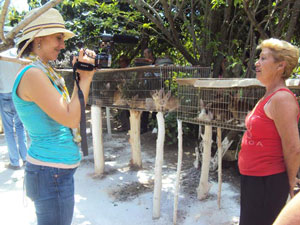Caribbean communications
First assignment on my new job: hop on a plane to Cuba.

Upon my arrival in Havana, I sat on an old wooden bench under the watchful eye of a young, smiling portrait of Fidel Castro. It was my first time in Cuba and I would spend the next three weeks exploring the lives of women farmers for Oxfam.
I had recently accepted a contract as a communications officer with the Ottawa-based organization, whose approach to ending poverty begins with women’s rights.
I was to interview women who benefited from an Oxfam program co-funded by the Canadian International Development Agency, called Engendering Change, which builds the capacity of local partners to advance women’s rights and economic empowerment.
Cuba is still recovering from a severe food security problem sparked by the collapse of the communist bloc in 1991. Ensuing trade embargos and softened prices for sugar, a key export, brought a decade of hardship.
Among the reforms implemented under Raùl Castro, president since 2008, land once used to grow sugar cane for export became available to small-scale producers to cultivate food.
This shift opens up new opportunities for women, who had been excluded from the labour-intensive sugar industry.
Working with local partners in Cuba since 1993, Oxfam has helped to implement irrigation systems, train farmers in organic agriculture, build resilience to natural disasters and improve women’s lives.
The results have been impressive. Food production has doubled in many cases and female participation in cooperatives has increased substantially.

I visited 15 agricultural cooperatives across eastern Cuba where I spoke with women about how Oxfam partner programs changed their lives and raised hopes for the future.
One 40-year-old resident of the town of Jiguani built a chicken coop with metal wire provided through the program. To her, it was more than just a roll of wire — it meant her family’s diet now included eggs and meat.
Another woman had left the city to become a farmer and provide a better life for her twin daughters. While it took an entire year to clear the land for farming, she now produces enough milk to supply her family and local shops. Previously, local children had no access to fresh milk.
Mainstream media often depict Cuba as a country rife with poverty and repression, where people long for pre-revolutionary days of prosperity and freedom. The reality is different.
The Cubans I met were full of energy, ideas and hopes for the future. Sure, life in Cuba is challenging, but the island is slowly opening up economically and with that comes opportunity.
Certain co-operatives can now sell directly to hotels. Women are starting to market and sell not only produce but also arts and crafts. In recent years, Cubans have been able to open restaurants and rent rooms to tourists. These small reforms bring significant changes to the Cuban experience.
Reporting on how Oxfam helps women improve their lives and those of their families and communities makes me feel I am a part of that change — both enabling and learning from it. I feel connected to these women and that makes me feel stronger.
It had been my dream to work creatively, travel and make a difference in the world. Thanks to my studies at Concordia and the professional experiences it led to, I had the skills and confidence to make it come true.
Related links:
• Oxfam Canada
• Concordia's Department of Communication Studies